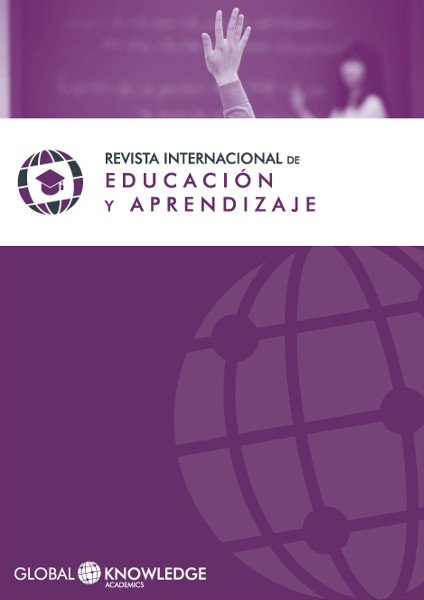Reflective thinking for the development and perfection of higher order thinking skills
DOI:
https://doi.org/10.37467/gka-revedu.v6.1575Keywords:
Scaffolding, Higher Order Thinking, Skills, Reflective, Thinking, MetacognitionAbstract
Education must lead the student body develop higher order thinking capabilities. Reflective thinking makes students reason in a superior way, so that they achieve to apply their knowledge. The objective was to know the way in which fifteen-year-old students develop their thinking skill through reflection. The methodology chosen was qualitative. During the investigation students solved and reflected questions of the PISA tests that evaluate their capacity to transfer knowledge, considering this as a high thinking skill. The results showed great progress in the thinking capacity of the students, improving their school performance and their level according to PISA.
Downloads
Global Statistics ℹ️
|
1813
Views
|
7242
Downloads
|
|
9055
Total
|
|
References
Argüelles, D. C. y Nagles, N. (2000). Estrategias para promover procesos de aprendizaje autónomo (Segunda edición). Colombia: Alfaomega colombiana.
Brooks, J. G. y Brooks, M. G. (2001). Becoming a constructivist teacher. En A. Costa (eds.), Developing minds: A resource book for teaching thinking (pp. 101–118, Ch. 27). Alejandría, VA.: Association for Supervision and Curriculum Development.
Correa, M. E., Castro, F. C. y Lira, H. (2002). Hacia una conceptualización de la metacognición y sus ámbitos de desarrollo. Horizontes Educacionales, 7, 58–63.
Costa, A. L., y Kallick, B. (2008). Learning and leading with Habits of mind. Alejandría, VA.: Association for Supervision and Curriculum Development.
Costa, A. L. (2001). Mediating the Metacognitive. En A. Costa (eds.), Developing minds: A resource book for teaching thinking (pp. 101–118, Ch. 64). Alejandría, VA.: Association for Supervision and Curriculum Development.
Dewey, J. (2004). Experiencia y Educación. Madrid: Biblioteca nueva.
Dewey, J. (2007). Cómo pensamos. Barcelona: Paidós.
González-Moreno, C. (2012). Formación del pensamiento reflexivo en estudiantes universitarios. Magis: Revista Internacional de Investigación En Educación, 4(9), 595–617.
González-Moreno, C., Solovieva, Y. y Quintanar, L. (2009). La actividad de juego temático de roles en la formación del pensamiento reflexivo en preescolares. Magis. Revista Internacional de Investigación En Educación, 2(3), 173-189.
González-Moreno, C., Solovieva, Y., y Quintanar, L. (2011). Actividad reflexiva en preescolares: perspectivas psicológicas y educativas. Universitas Psychologica, 10(2), 423–440. DOI: https://doi.org/10.11144/Javeriana.upsy10-2.arpp
Henao, M. y Solórzano, B. A. (2012). Una aproximación al desarrollo del pensamiento en el adolescente. Revista Universidad EAFIT, 31(100), 53–60.
Hernández, R., Fernández-Collado, C. y Baptista, P. (2008). Metodología de la Investigación (Cuarta edición). México: McGraw-Hill.
Hmelo, D. y Ferrari, M. (1997). The problem-based learning tutorial: Cultivating higher order thinking skills. Journal for the Education of the Gifted, 20(4), 401–422. DOI: https://doi.org/10.1177/016235329702000405
Lipman, M. (1998). Pensamiento complejo y educación (Segunda edición). Madrid: Ediciones de la Torre.
Martin, W. (2001). Building a thoughtful High school. In A. Costa (eds.), Developing minds: A resource book for teaching thinking (pp. 126–130, Ch. 23). Alejandría, VA.: Association for Supervision and Curriculum Development.
Moore, T. (2006). Filosofía de la Educación. México: Trillas.
Nickerson, R., Perkins, D. y Smith, E. (1985). The teaching of thinking.
Hillsdale, N.J.; Lawrence Erlbaum Associates.
Ormrod, J. E. (2011). Aprendizaje humano (Cuarta edición). Madrid: Pearson Prentice Hall.
Quinn, M. (1990). Qualitative evaluation and Research methods (Second edition). Newbury Park: Sage Publications.
Quinquer, D. (2008). Modelos y enfoques sobre la evaluación: el modelo comunicativo. En Laboratorio Educativo (eds.), Evaluación como ayuda al aprendizaje (pp. 13–19, Ch. 1). Barcelona: Graó.
Richart, R. y Perkins, D. (2008). Making thinking visible. Educational leadership, 65(5), 57–61.
Saiz, C. (2002). Enseñar o aprender a pensar. Escritos de Psicología, 6, 53–71. DOI: https://doi.org/10.24310/espsiescpsi.vi6.13411
SEP, Secretaría de Educación Pública. (2011). Plan de estudios 2011. Educación básica. México: SEP, Secretaría de Educación Pública.
Song, H. D., Koszalka, T. y Grabowski, B. (2005). Exploring Instructional Design Factors Prompting Reflective Thinking in Young Adolescents. Canadian Journal of Learning and Technology, 31(2), 1-17. DOI: https://doi.org/10.21432/T2BC8X
Downloads
Published
How to Cite
Issue
Section
License
Those authors who publish in this journal accept the following terms:
-
Authors retain copyright.
-
Authors transfer to the journal the right of first publication. The journal also owns the publishing rights.
-
All published contents are governed by an Attribution-NoDerivatives 4.0 International License.
Access the informative version and legal text of the license. By virtue of this, third parties are allowed to use what is published as long as they mention the authorship of the work and the first publication in this journal. If you transform the material, you may not distribute the modified work. -
Authors may make other independent and additional contractual arrangements for non-exclusive distribution of the version of the article published in this journal (e.g., inclusion in an institutional repository or publication in a book) as long as they clearly indicate that the work was first published in this journal.
- Authors are allowed and recommended to publish their work on the Internet (for example on institutional and personal websites), following the publication of, and referencing the journal, as this could lead to constructive exchanges and a more extensive and quick circulation of published works (see The Effect of Open Access).













